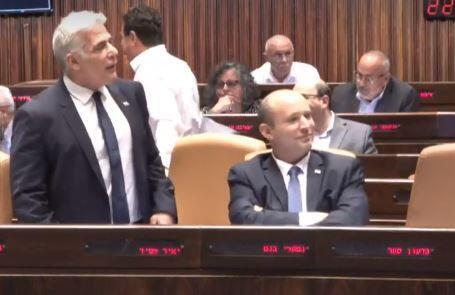Getting your Trinity Audio player ready...
State Comptroller Matanyahu Englman has begun an investigation into the failings of the IDF leading up to the October 7 Hamas massacre. IDF Chief of Staff Herzi Halevy was told in a letter, to surrender all classified military material as well as any and all data regarding all levels of interaction between IDF and the political echelon.
Read more:
Unwilling to wait for neither a formal national investigative committee nor the conclusion of the war, the State Comptroller seems eager to delve into the most controversial areas in Israeli society, but not everyone is pleased with the direction he is taking.
2 View gallery


Englman expects Halevy's full cooperation
(Photo: Yair Sagi, IDF Spokesperson's unit)
"This is the ideal way of laying all the blame on the military, thereby absolving politicians," said an official. "It's a charade designed to turn the IDF into a scapegoat while ensuring politicians bear no cost from a national inquiry."
In his letter to Halevy, Englman said he expects full cooperation from every level and branch of the IDF, including surrendering sensitive and classified materials. Signs indicate Englman hopes for a streamlined process that will take no more than a few months, even as the IDF is busy dealing both with Hamas in the south and Hezbollah in the north.
The letter included a document detailing 33 separate issues that are set to be thoroughly examined, such as the events of October 7, border protection, data safety, IDF equipment disparity issues and national advocacy. However, the government's conduct will similarly be scrutinized, as the report will touch on all dealings within the Cabinet for two years prior to the war (A timeframe that includes the Bennett-Lapid government as well), work procedures within the intelligence community, how information preceding the massacre was collected and reviewed and Israel's own national perception of security, among others.
A State Comptroller's work proceedings are notably different than that of an official commission of inquiry, as his report will contain no public testimony, no protocols and no opportunity for officials who wish to be heard. A State Comptroller's mandate touches on acquisition, process streamlining, reviewing usage of public resources and public conduct above reproach.
The 33 issues set to be examined are as follows:
1) The events and national response to October 7
2) Gaza Border control before the war
3) How did government and intelligence officials processed information about Hamas
4) National intelligence work procedures and protocols
5) Auxiliary squad status in Gaza border communities
6) Perception of national security and how it affected IDF procedures
7) How well was the IDF prepared to handle the subterranean threat posed by Hamas
8) Economical procedures for fighting terrorism
9) Informational security and how much was exposed to Hamas before the war
10) Lack of equipment for frontline soldiers
11) Development and allocation procedures for wartime equipment
12) How efficiently ammo was replenished
13) Effectiveness of security corridors in greater Jerusalem
14) How the IDF monitoring array faltered on October 7
15) A national communication apparatus to effectively handle evacuations
16) Warfare equipment manufacturing system
17) Identifying and evacuating the deceased from war torn areas
18) Cyber security for protecting national infrastructure and protecting communities
19) Nuclear research security
20) Sheltering spaces in smaller communities
21) How the security cabinet operated in 2022 and 2023
22) Management of civic security operations
23) The Re'im festival permit and security protocols
24) Security is Sderot and Ofakim
25) Operations within the National Security Ministry and coordination with police
26) Coordination between donation officials and government officials
27) Government's dealing with opinion makers
28) National advocacy during the war
29) Agricultural activities during the war
30) Managing evacuated communities during the war
31) Managing the disabled population
32) Transporting the wounded to hospitals when the war began
33) Emergency procedures for supplying food
"Building the war audit program"
"The organizational audit of the handling of the home front will begin within the next few days, with the start of the audit about the defense forces being conducted in accordance with the development of the war, in view of the fact that the war is still going on and that for more than 80 days IDF officers and soldiers are toiling day and night in a bloody war inside the Gaza Strip and all Israeli citizens must support them at this time," The State Comptroller's office said. "Nevertheless, it is clear even now that the Israeli government and the defense forces must conduct a thorough internal examination as to how the great failure on 7.10 occurred."


